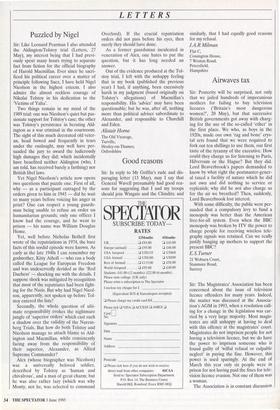LETTERS Puzzled by Nigel
Sir: Like Leonard Pearman I also attended the Aldington/Tolstoy trial (Letters, 27 May), my interest being that I had previ- ously spent many hours trying to separate fact from fiction for the official biography of Harold Macmillan. Ever since he sacri- ficed his political career over a matter of principle following Suez, I have held Nigel Nicolson in the highest esteem. I also admire the almost reckless courage of Nikolai Tolstoy in his dedication to the `Victims of Yalta'.
Two things remain in my mind of the 1989 trial: one was Nicolson's quiet but pas- sionate support for Tolstoy's case; the other was Tolstoy's persistence in berating Ald- ington as a war criminal in the courtroom. The sight of this much decorated old veter- an, head bowed and frequently in tears under the onslaught, may well have per- suaded the jury to award the ludicrously high damages they did; which incidentally have benefited neither Aldington (who, I am told, has received barely a farthing) nor British libel laws.
Yet Nigel Nicolson's article now opens two questions that puzzle one. First of all, why — as a participant outraged by the orders given to him in 1945 — did he wait so many years before voicing his anger in print? One can respect a young guards- man being unable to refuse an order on humanitarian grounds; only one officer I know had the courage, and he went to prison — his name was William Douglas Home.
Yet, well before Nicholas Bethel! first wrote of the repatriations in 1974, the bare facts of this sordid episode were known. As early as the late 1940s I can remember my godmother, Kitty Atholl — who ran a body called the League for European Freedom and was undeservedly derided as the 'Red Duchess' — shocking me with the details. I suppose shock was mitigated by recognition that most of the repatriates had been fight- ing for the Nazis. But why had Nigel Nicol- son, apparently, not spoken up before Tol- stoy entered the lists?
Secondly, the whole question of ulti- mate responsibility evokes the nightmare jungle of 'superior orders' which cast such a shadow over the validity of the Nurem- berg Trials. But how do both Tolstoy and Nicolson manage to attach blame to Ald- ington and Macmillan, while consistently facing away from the responsibility of their superior, Alexander, as Allied Supreme Commander?
Alex (whose biographer was Nicolson) was a universally beloved soldier, described by Tolstoy as 'human and chivalrous', and a man of great charm; but he was also rather lazy (which was why Monty, not he, was selected to command Overlord). If the crucial repatriation orders did not pass before his eyes, then surely they should have done.
As a former guardsman inculcated in veneration of Alex, one hates to put the question, but it has long needed an answer.
Out of the evidence produced at the Tol- stoy trial, I left with the unhappy feeling that in my book (published the previous year) I had, if anything, been excessively harsh in my judgment (based originally on Tolstoy's allegations) of Macmillan's responsibility. His 'advice' may have been questionable; but he was, after all, nothing more than political adviser subordinate to Alexander, and responsible to Churchill and Eden.
Alistair Home
The Old Vicarage, Turville, Henley-on-Thames, Oxfordshire


































































 Previous page
Previous page